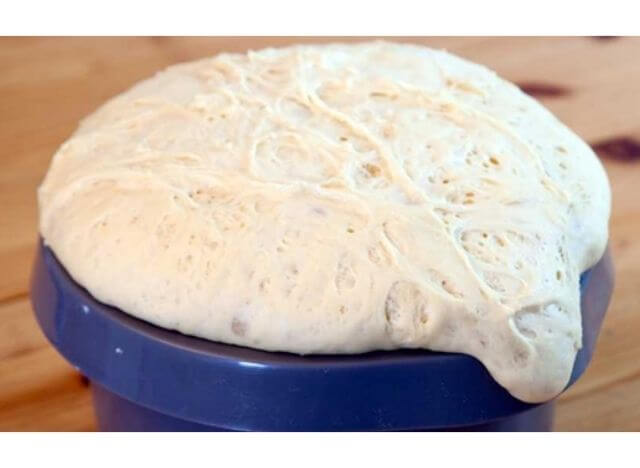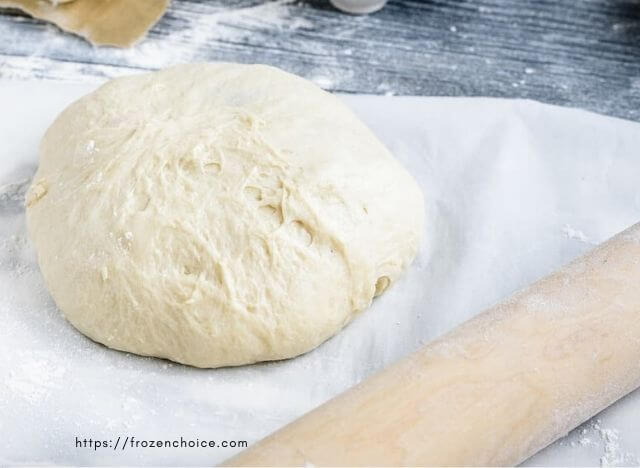Dough is one of the most popular ingredients used in many applications, especially baking breads. However, bread baking is very time-consuming and you can’t do everything you want to the dough.
Whether you are a beginner or the one with decent time spent into the hobby, you can eventually run into a problem that your dough has risen, yet you don’t have time to complete the baking process.
With the problem, a question starts to form: can you keep the risen dough in the fridge for later uses? What will happen to the dough? Can you refrigerate dough after it rises?
Can you refrigerate dough after it rises?
Absolutely yes. You can refrigerate the dough after it rises just fine. It can sometimes have positive effects on the dough. However, you need to follow certain measures to safely keep the dough inside the fridge.
What will happen to the risen dough when put in the fridge?

Under normal conditions, the dough will rise when it begins to proof. However, when being refrigerated, the dough’s expanding rate slows down a lot.
This is because yeast (the microscopic fungus that can turn grapes into wine) is less active in cold temperatures.
With that being said, refrigerating the risen dough will only slow down the expanding rate, not stop it. That’s why you can’t just keep the risen dough in the fridge forever.
You will also need to watch out for cracked or dried out dough while it is kept in the fridge. Generally, try to prepare the dough properly beforehand, and keep it in airtight containers.
Further reading: Best Top-Freezer Refrigerator without Ice Maker
Risen dough in the fridge gives the dough a unique flavor
You can refrigerate the risen dough overnight to prevent it from being over-fermented. The process also gives the dough a yeasty flavor.
This can be extended into the double-rise method where you refrigerate the dough in the first rise, and then leave it be for the second rise. You technically can refrigerate the dough on the second rise, but its quality will drop a lot.
When you bake a pre-prove dough, try to watch the dough’s rising rate thoroughly, and make sure to cook it perfectly. The overproof dough comes with a challenge where the expanded gas bubbles can fall in the oven.
How to refrigerate dough?
After kneading the bread, you should put the dough into the fridge right away. Here are the steps.
- Put the dough in a big container like a bowl or a plastic bag. Cover the container with a little oil so that the dough will not be sticking later.
- Cover the bowl tightly and completely with plastic wrap.
- Put it into the refrigerator. You can let it stay there in about 24 hours.
When using it, you need to take it out, punch it down and wait for it to rest before making the desired shapes.
How long can you refrigerate dough after it first rises?
While you can technically refrigerate the dough as long as you want, as mentioned above, you only slow down the rising process, not stop it.
So, you will only want to refrigerate the dough for 3 days at most, and ideally no more than 2 days. If you stay in this time frame, the bread should mostly maintain its normal shape and have a yeasty taste.
If you leave the risen dough in the fridge for more than 3 days, you are at great risk of over-proving the dough.
Refrigerating bread dough: the pros and cons
In short, it has great rewards to many people but comes with certain risks.
Pros
The process of slows down drastically the dough will bring the following benefits:
Better taste and texture: The longer time for raising will help to increase the bread’s favor. When slows down the yeast rise time, your dough will have deeper and more complex flavors.
Better look for the bread: The long proofing time will make the crust look darker and more vibrant after baking.
Convenience: The process of making bread will take lots of time because of many steps including kneading, mixing, and baking. When you are busy, you are easily split these steps over the course of a weekend.
Cons
If you are not fast enough and bake the dough right after the first rise, the dough can be over-proof, be damaged or get stuck in its original container.
Tips on refrigerating bread dough
Although the overprove result can not be avoided, you can take some measures to make sure you end up with a good bake:
Quickly refrigerate the dough
The dough can be overprove very quickly when left in the normal condition. But also, the longer you keep it outside, the harder the refrigerating process can save you.
You should immediately think about refrigerating the dough when you realize that you can’t bake your dough in time.
Cover the dough using oil
A thin oil layer can prevent the dough from sticking to the container, which leads to stretching, tearing, and damaging the dough.
Keep the dough in an airtight container
Leaked air can make the dough dry out and crack its edges.
You can store the dough in an airtight zip-lock bag or use plastic wrap to cover the dough bowl. Either way, try to check properly to make sure no air is getting to the dough container.
Let the dough warm up
Before baking the dough, leave it outside for a while so that it warms up to the normal temperature.
You may also like: What Are the Best Cheap Freezers for Home?
Conclusion
Overall, refrigerating the risen bread dough can slow down the overprove process and give the bread yeasty taste, but you should not keep it in the fridge for more than 2 days.
Also, keep the dough in an airtight container and let it warm up before baking.
Reference:
1. Can I Refrigerate Bread Dough After the First Rise & Bake it Later?, sweethomedigest.com, Retrieved on Jan 20, 2022
2. Refrigerate Dough After It Rises, foodsquestions.com, Retrieved on Jan. 21, 2022

